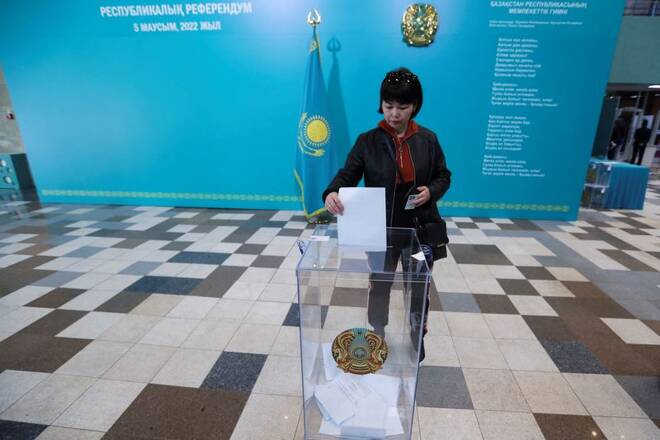Advertisement
Advertisement
Kazakh leader seeks political capital in constitutional reform vote
By:
ALMATY (Reuters) - Kazakhstan votes on a constitutional reform on Sunday promoted by President Kassym-Jomart Tokayev as a step towards liberalising the tightly-run oil-rich nation, although it would still leave key powers in his hands.
ALMATY (Reuters) -Kazakhstan voted on a constitutional reform on Sunday promoted by its president as a step toward liberalising the Central Asian republic, though it would still leave key powers in his hands.
The reform is likely to give President Kassym-Jomart Tokayev, 69, the political capital he needs to run for a second term in oil-rich Kazakhstan, this time without the backing of his former patron and predecessor Nursultan Nazarbayev.
In power since 2019 following Nazarbayev’s abrupt resignation after three decades in charge, Tokayev has only fully emerged as an independent figure this year after putting down an attempted coup in January and removing Nazarbayev and his relatives from key positions in the government.
Aside from moves to decentralise decision-making and allow greater representation of various groups in parliament, the reform will also strip Nazarbayev of his “national leader” status which granted him lifetime privileges.
The president, however, would retain powers to appoint judges and regional governors and dissolve parliament.
Tokayev has described the proposed changes as a move from a “super-presidential” system to a presidential republic with a strong parliament. Although critics say the reform is cosmetic, it does signal a reversal from a decades-long trend towards strengthening presidential powers.
“We are… laying the foundation for the Second Republic,” Tokayev said, addressing the nation on the eve of the vote.
He voiced confidence on Sunday that his initiative would pass: “There is a lot of work ahead, we will need to implement the constitutional provisions for which we are voting.”
More than 68% of voters cast their ballots by 10 p.m. local time (1600 GMT), the Central Election Commission said, well above the required 50% threshold. The results are expected on Monday.
Some, however, complained that the proposed changes to more than 30 articles of the constitution were too complicated.
“Have you read those amendments? It is a puzzle,” said Natalia, 64, who declined to give her last name and chose not to vote.
Analysts said the referendum was in part a response to January’s unrest which started as a protest against a fuel price hike and evolved into a broad display of public discontent with a system that concentrates power and wealth in the hands of a few.
Tokayev has also called for higher taxes on the lucrative extractive industries and high-income individuals, saying social justice would be the cornerstone of a new social contract.
Addressing domestic policy concerns would free up the career diplomat’s hands to deal with unprecedented external turbulence.
Caught between major economic and security partner Russia and the West, which has invested hundreds of billions of dollars in its giant oilfields and mines, Kazakhstan is trying to navigate a way through the Ukraine crisis without angering either side.
(Reporting by Mariya Gordeyeva and Olzhas Auyezov; Additional reporting by Tamara Vaal in Nur-Sultan; Editing by Christina Fincher, Mark Heinrich and Tomasz Janowski)
About the Author
Reuterscontributor
Reuters, the news and media division of Thomson Reuters, is the world’s largest international multimedia news provider reaching more than one billion people every day. Reuters provides trusted business, financial, national, and international news to professionals via Thomson Reuters desktops, the world's media organizations, and directly to consumers at Reuters.com and via Reuters TV. Learn more about Thomson Reuters products:
Did you find this article useful?
Latest news and analysis
Advertisement
